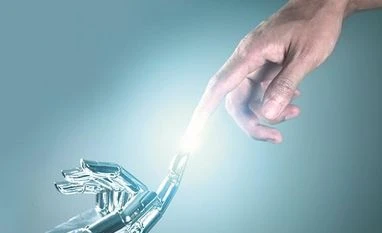Looking back, many people agree that one of the most significant phenomenon over the last decade was the rise of the smartphone. Sending a message half-way across the world to a friend or cousin for free, browsing the most recent cricket score while streaming music and ordering biryani via Swiggy, or, catching a relatively inexpensive car ride to the train station would not be possible without the smartphone. The same goes for location-based dating and navigation apps.
Today, there are about 3 billion smartphone users or almost every other person in the world has one. At the start of 2010, just one in 20 people used a smartphone regularly. Today, India alone has roughly 400 million smartphone users.
The sharing economy is built on the smartphone foundation with the help of other technologies such as cloud computing. Smartphone communication is mediating our careers and communities and having a salutary effect along with another recent trend: The emergence of artificial intelligence (AI) in almost every walk of life. Productivity benefits and value have been realised via a deft combination of search, learning and optimisation algorithms acting on carefully chosen data guided by domain knowledge. Humans principally architect and train AI systems and once trained, the hybrid “humachine” team can be smarter and more capable than either human or machine alone. However the onus is on today’s humans to build and use AI responsibly.
It is worth underscoring a few things: First, climate change is a global threat; the scientific evidence is overwhelming. Second, AI is much like fire — it needs to be tamed and is prone to misuse in the wrong hands. Recall that eons ago, exploiting and using fire provided many benefits — chief among them, the ability to time shift (many activities could continue after sunset) and space shift (that is, it made possible living and working in a dark, but sheltered cave as well as migration to colder climates, reducing competition for scarce resources via geographical dispersion). AI, in tandem with other recent technologies, has permitted not only time and space shifting, but also knowledge shifting. The result is enormous flexibility around when, where and how goods and services are produced (and consumed). Third, having enjoyed all the world’s resources — from oil to clean air — and the benefits of recent technological advances, the current generation has a responsibility to future generations.
Will humanity become smarter over the next decade while making the twenties roar again, this time globally and responsibly? Will we be wise enough as a society to tackle climate change, inequality in (access to) health, wealth and wisdom and a myriad of such issues to leave the world a better place to the next generation?
How do we humans become smarter over the next decade? A candidate lodestar is the set of Sustainable Development Goals (SDGs) recommended by the United Nations. The 17 goals include “no poverty”, “reduced inequalities”, “climate action” as well as “peace, justice and strong institutions”. It can be thought of as a call to action to protect the planet, and at the same time, ensure peace, harmony and prosperity for all by 2030. We become smarter by harnessing AI and other advanced technologies especially towards these prioritised goals — one, doing no harm, that is, taking steps to preempt warfare of all kind, be it kinetic, cyber or biological; two, preserving democratic institutions and the rule of law; three, providing contemporary, free K-12 education for all, so that where a child is born does not dictate how far she would go in life and how long she would live; four, exploring geoengineering schemes — for instance, afforestation or reforestation, solar radiation management, as well as carbon dioxide and other greenhouse gas removal —to turn the clock back on climate change.
I hope we become more conscious about consuming less — especially paper, plastics and power. Studies tell us that millennials are becoming parsimonious with respect to spending on things, and attracted more to experiences. Experiences are key in today’s world laced with digital overdose; it helps strengthen human relationships and builds empathy and teamwork, the valuable soft-skill smarts.
What the Red Queen said to Alice (in Lewis Carroll’s Through the Looking-Glass) comes to mind: “Now, here, you see, it takes all the running you can do, to keep in the same place. If you want to get somewhere else, you must run at least twice as fast as that!” Yes, we will all be running twice as fast in the next decade, toting a smartphone and guided by AI. Let us make sure we are smarter about what we are running towards — sustainable goals that will make the next generation happy and us, the current generation, responsible in their eyes.
The author is an AI expert, adjunct faculty member at Carnegie Mellon University and past president of the Pittsburgh chapter of TiE.org
Unlock 30+ premium stories daily hand-picked by our editors, across devices on browser and app.
Pick your 5 favourite companies, get a daily email with all news updates on them.
Full access to our intuitive epaper - clip, save, share articles from any device; newspaper archives from 2006.
Preferential invites to Business Standard events.
Curated newsletters on markets, personal finance, policy & politics, start-ups, technology, and more.
)